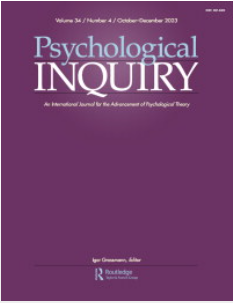意识形态选择和信念的心理计算:整合心理经济学和贝叶斯信念模型的效用
IF 4.1
2区 心理学
Q1 PSYCHOLOGY, MULTIDISCIPLINARY
引用次数: 1
摘要
快速浏览一下政治景观就会发现,人们信奉和倡导的意识形态各不相同。为什么个人会偏爱某些意识形态?对心理需求和消费欲望的正式分析表明,可以计算出选择一种意识形态而不是另一种意识形态的主观效用,就好像这是一个购买决定一样。给定资源、约束和可用选项,个人可以理性地选择最符合或最符合他们利益的意识形态。这是一个引人注目的框架,可以考虑到不同的意识形态如何满足人们多样化和多维度的心理和物质需求。这个心理经济模型是雄心勃勃的,信息丰富的,我认为,如果将其扩展到意识形态认知的两个关键组成部分,它甚至可以更具包容性和启发意义:(1)意识形态信念和极端主义的本质;(2)构成信仰形成、保存和变化基础的动态、概率心理计算。首先,我将论证意识形态选择的正式模型无法逃避意识形态承诺的强度问题。换句话说,我们不仅要问个人选择了哪种意识形态,还要问他们一旦选择了这些意识形态,他们对这些意识形态的坚持程度有多高。对意识形态选择的分析需要伴随着对意识形态信念的分析。其次,将不确定性原则和基于概率的信念更新原则纳入意识形态世界观的形式模型中,有助于建立对意识形态思维背后合理性的健全认识。贝叶斯模型强调人类大脑如何通过更新他们的信念和偏好,以与他们先前的期望和感官体验成正比的方式,寻求建立对世界的预测模型。因此,将贝叶斯原理纳入意识形态选择的正式模型,将提供一个更全面的理解,当一个思想进入信仰体系市场时会发生什么,以及为什么一个思想有时会购买卖家和企业家展示的有毒剂量的意识形态。本文章由计算机程序翻译,如有差异,请以英文原文为准。
Mental Computations of Ideological Choice and Conviction: The Utility of Integrating Psycho-Economics and Bayesian Models of Belief
A quick scan of the political landscape reveals that people differ in the ideologies they embrace and advocate. Why do individuals prefer certain ideologies over others? A formal analysis of psychological needs and consumption desires suggests that it is possible to compute the subjective utility of selecting one ideology over another, as though it were a purchasing decision. Given resources, constraints, and available options, individuals can rationally choose the ideology that best matches or resonates with their interests. It is a compelling framework that can take into account how diverse ideologies satisfy people’s diverse and multidimensional psychological and material needs. This psycho-economic model is ambitious and informative, and I will argue that it can be even more encompassing and enlightening if it is expanded to incorporate two critical components of ideological cognition: (1) the nature of ideological conviction and extremism and (2) the dynamic, probabilistic mental computations that underlie belief formation, preservation, and change. Firstly, I will argue that a formal model of ideological choice cannot escape the question of the strength of ideological commitment. In other words, we need to ask not only about which ideologies individuals choose but also about how strongly they adhere to these ideologies once those are chosen. An analysis of ideological choice needs to be accompanied by an analysis of ideological conviction. Secondly, in order to build a robust sense of the rationality behind ideological thinking, it is useful to incorporate principles of uncertainty and probability-based belief updating into the formal model of ideological worldviews. Bayesian models highlight how human brains seek to build predictive models of the world by updating their beliefs and preferences in ways that are proportional to their prior expectations and sensory experiences. Consequently, incorporating Bayesian principles into the formal model of ideological choice will provide a more wholistic understanding of what happens when a mind enters the market for belief systems – and why a mind can, at times, purchase toxic doses of the ideologies that sellers and entrepreneurs offer on display.
求助全文
通过发布文献求助,成功后即可免费获取论文全文。
去求助
来源期刊

Psychological Inquiry
PSYCHOLOGY, MULTIDISCIPLINARY-
CiteScore
10.30
自引率
1.10%
发文量
31
期刊介绍:
Psychological Inquiry serves as an international journal dedicated to the advancement of psychological theory. Each edition features an extensive target article exploring a controversial or provocative topic, accompanied by peer commentaries and a response from the target author(s). Proposals for target articles must be submitted using the Target Article Proposal Form, and only approved proposals undergo peer review by at least three reviewers. Authors are invited to submit their full articles after the proposal has received approval from the Editor.
 求助内容:
求助内容: 应助结果提醒方式:
应助结果提醒方式:


